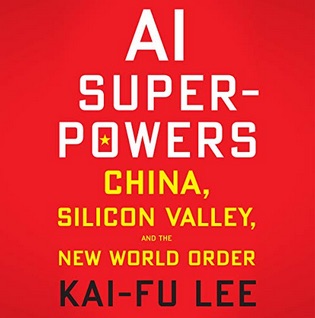by Ian R. Campbell | August 9, 2019 | Technology

Articles, books, and presentations periodically come to our attention we think business owners and their advisors ought to find valuable. This presentation is one of those. Review time is estimated to be about 20 minutes. Thinking time may be much longer.
Have you read AI Super-Powers: China, Silicon Valley, and the New World Order?
Answer: If you are a business owner or an advisor to business owners I strongly suggest you buy Kai-Fu Lee’s recently published book[1], read it, and carefully reflect on what you read in the contexts of business value, business transition, and how much different our world is likely to be when near- and longer-term AI related changes are virtually certain to occur ‘before our very eyes’.
If Charles Darwin, whose theories I discussed in my last post – see Change, Darwin’s Thesis, and Business Value and Transition – had an opportunity to read this book he just might say “I told you so.”
What is meant by the term artificial intelligence?
Answer: Artificial intelligence (AI) is an umbrella term used to describe the ability of a mechanical device (e.g. a computer or computer-controlled robot) and related programming and systems endowed with the ability to reason, discover meaning, generalize, self-correct, and – importantly in the context of deep learning – learn from past experience.
What is meant by the artificial intelligence term ‘deep learning’?
Answer: Deep learning is a term used to describe the use of computer algorithms to progressively manipulate large amounts of data to generate otherwise unobtainable, useful outputs that can be used to improve both commercial and non-commercial results.
Deep learning through algorithmic activity may prove to be the greatest business game changer of all – and hence to business-specific prospective value and in business-specific transition contexts.
Who is Kai-Fu Lee, and what does he know about artificial intelligence?
Answer: Dr. Kai-Fu Lee is the chairman and CEO of Sinovation Ventures[2], a China-based venture capital firm. Educated in the United States, prior to founding Sinovation Ventures he was President of Google China having previously held U.S. executive positions with Apple, SGI and Microsoft. Lee is said to be:
- one of the world’s most respected experts on Artificial Intelligence and on China.
- an oracle when it comes to predicting the future of technology in China.
A former Apple CEO likens Lee’s explanation of the ‘new AI world order’ to Steve Jobs early explanation of how personal computing would fundamentally change humanity.
See Dr. Kai-Fu Lee interviewed on CBS’s 60 Minutes earlier this year.
In 149 words, why should I read AI Super-Powers?
Refined Answer: Among many other things, Lee explains in his book why he believes:
- AI will advance quickly and exponentially.
- AI will create U.S. and China dominance, where the U.S. and China are culturally different.
- AI will result in job losses and in growing inequality both between and within countries.
- AI, in particular ‘deep learning’, will revolutionize dozens of industries. Business owners and their advisors need to read Lee’s book, and then interpolate what AI is likely to mean – both directly and indirectly – to their businesses, those of their clients, and to business value and transition options.
- Chinese government officials, entrepreneurs, and investors are “ramping up AI investment, research, and entrepreneurship on a historic scale”.
- Recent, powerful developments tip the balance of AI power in China’s direction.
Crass Answer: If you have to ask you probably shouldn’t. Instead, have fun until you don’t.
One Minute Survey
[1] Available at Amazon, Apple, and likely at your favorite bookstore.
[2] From the Sinovation Ventures website – August 2019: Sinovation Ventures is an established Chinese technology-savvy investment firm, started in 2009 by a team led by Dr. Kai-Fu Lee, with presence in Beijing, Shanghai, Shenzhen, Seattle and Silicon Valley. We currently manage an over $2B AUM between seven USD and RMB funds in total, and over 300 portfolio companies across the technology spectrum in China and the U.S. We are one of the first Chinese ventures firms establishing a presence and investment practice in the U.S.
Tags: advisor to business owners, AI, AI entrepreneurship, AI investment, AI learning, AI pwer, Apple, Artificial Intelligence, Business Owner, business transition, Business Value, business-specific transition, business-specific valuation, China, deep learning, Kai-Fu Lee, Microsoft, robot, Silicon Graphics Inc., Silicon Valley, Technological Advances, Technology, United States
by Ian R. Campbell | May 3, 2019 | Business Value and Transition

Why is a picture of Charles Darwin[1] relevant to a discussion of business value and transition?
Answer: Based on 50 years of business value and transition consulting experience I believe:
- we live in a watershed economic, business, and business value and transition environment.
- today, as never before, Charles Darwin’s thesis of natural selection needs to be understood and considered by every business owner.
What is Charles Darwin’s thesis of natural selection?

Initially, Darwin did not use the term Survival of the fittest. Instead, British economist Herbert Spencer used that phrase after reading Darwin’s 1859 book On the Origin of Species. It caught on, and Darwin used the term in a subsequent edition of his book.
Survival of the fittest is an umbrella phrase that masks and leads many to misinterpret Darwin’s messaging. If one takes the time to read and consider other quotes attributed to Darwin[2] it becomes clear that a high level Darwin’s thesis can be stated to be:
‘those who implement change to their advantage more quickly than others are those who, through collaboration, best identify and adapt to change.’
Is ongoing economic and business change impacting business value and transition?
The answer must be ‘yes’ given the smorgasbord of ongoing inter-related economic and business-related segment changes that include:
- Globallization.
- Potential de-globalization if President Trump has his way.
- Central bank policies – particularly after 2008.
- Developed and developing country government debt, government intervention, government policies, and government intervention.
- Technological advances.
- Business consolidation.
- Financial markets heavily influenced by algorithmic trading.
- Climate change.
- World population growth and societal disruption.
- Incomplete, sensationalized, and in some cases what appears to be poorly researched news.
These and other things will continue to impact both the value and transition of most if not all large and small publicly and privately-owned businesses to varying positive and negative degrees.
Concerning that melded ongoing change:
- Some of these changes and related changes are more predictable than others.
- The pace of change is likely to escalate in some of the cited segments.
- All businesses will be influenced in varying degrees and for better or worse by ongoing changes.
- For some companies these changes collectively may lead to business value enhancement, for others business value deterioration – and hence to greater or less business transition success.
How does Darwin’s thesis play into a discussion of business value and transition?

Business value growth and in turn successful business transition are both influenced – I believe in an ever-escalating way – by the degree to which business owners accept and act upon Darwin’s thesis.
It is crucial that all business owners hear this messaging, and that each decide whether they agree it makes sense. Moreover, this messaging is particularly important for owners of family businesses. That is because there is a greater proclivity for family business owners to compromise from arm’s length principles where their emotional intelligence plays too large a part in their business decision making.
I believe that all business owners should consider Darwin’s thesis and apply it to their specific circumstances. Private company business owners, irrespective of whether the business is family-owned, need to consider their ability to adapt quickly to changing business conditions and prospects having regard to their collective capabilities and the current and prospective financial position of their company.
Private company business owners should consider now – and on an ongoing basis as they experience continuing change in our increasingly competitive business environment:
- whether developments and advances outside their control are impacting the near- and long-term risks and going-concern viability of their business.
- whether the long-term going-concern viability of their business is at risk as a result of its current financial position, growth prospects, and competitive prospects going forward.
- whether the size and prospective size of their business are such that it will be able to compete effectively in the near- and long-term. This where larger companies in many cases seem increasingly likely to be favored in the contexts of – among other things – both supply and demand chain metrics as a result of ongoing globalization and technology advances and the costs and cost savings related to both of those things.
- whether as a result of conclusions reached in respect of business viability and likely future competitiveness, whether their business should be offered for sale now, or be prepared for sale at some point in the next, say, two – five years.
- whether current employees need to be replaced with persons better equipped to face current and prospective competitive challenges.
- whether ongoing technological advances may have a material favorable or adverse effect on their business in the contexts of both required future capital investment, and the timing of that investment.
Finally, in family businesses, it is becoming ever more critical to consider whether employed family members should retain their current positions, or should assume jobs that better suit their skill sets. Any family business owner that objectively makes such assessments and acts on them will bring a smile to Charles Darwin’s face, wherever he now is.
[1] Charles Darwin’s (1809 – 1882) book On the Origin of Species by Means of Natural Selection, or the Preservation of Favoured Races in the Struggle for Life was first published in 1859.
[2] For example, Darwin is quoted as saying: “It is not the strongest of the species that survives, nor the most intelligent that survives. It is the one most adaptable to change, that lives within the means available and works co-operatively against common threats.” ”The world will not be inherited by the strongest, it will be inherited by those most able to change.” “It is not the biggest, the brightest or the best that will survive, but those who adapt the quickest.” “In the long history of humankind (and animal kind, too) those who learned to collaborate and improvise most effectively have prevailed.”
Tags: advisors, board of directors, business, business consolidation, Business Owner, business owners, business transition, Business Value, business value and transition, business value growth, central bank pollicies, Charles Darwin, Climate Change, companies, company, Darwin’s thesis, de-globalization, Family Business, family business owners, financial markets, Globalization, going concern viability, Government Debt, government intervention, government policies, government regulation, natural selection, ownership transition, population growth, privately-owned, publicly-traded, Recession, Regulation, societal disruption, survival of the fittest, Technological Advances
by Ian R. Campbell | February 5, 2019 | Business Viability

I suggest the number one ‘right’ question business owners and their advisors need to ask today is: Does your business currently have a strong enough balance sheet to enable it to survive and prosper through at least two years of recession?
Prior to readers answering that question in the context of any given business, I further suggest they focus and reach conclusions on the following supplemental questions:
- Does your business have unused borrowing capacity available if funding to bridge a business downturn is required?
- Does your business own assets redundant to its operations that could be liquidated if necessary?
- Can your business significantly improve its operating discretionary cash flow by achieving labor, material, overhead or other cost savings within its current cost structure?
- Does your business have well-maintained capital equipment that will not necessitate large capital expenditures in the foreseeable future as a result of un-remedied wear and tear?
- Irrespective of the state of maintenance of the current capital equipment of your business will your business likely face major capital equipment requirements as a result of ongoing technological advances?
- If your business is likely to face technology-related major capital equipment requirements is the timing of that spend going to occur earlier than you previously anticipated?
- Does your business have significant contingent environmental, unfunded pension or other liabilities that may negatively affect its long-term viability?
- Is your business subject to declining operating margins and after-tax discretionary cash flow in an increasingly competitive business environment?
Answer/Commentary
In our current and prospective economic, business and societal environment for most businesses continual review of balance sheet strength needs to be a, if not the top business owner priority. This where balance sheet strength at any given point in time means in:
- the first instance that a business has an adequate yet efficient level of working capital to meet its business plan.
- the second instance means that a business is not over-levered. That is, the business does not owe more than an appropriate amount of third-party interest-bearing debt given its asset base and its current and expected annual operating before- and after-tax discretionary cash flow.
- the third instance ensuring a business is financially positioned to be able to survive significant both anticipated and unanticipated external and internal economic, industry, and company-specific events.
In our current environment, I suggest the importance of balance sheet strength can’t be underrated. This given prevailing economic, business and financial markets uncertainty that follows from, along with other things:
- We have not experienced a period of recession (defined by economists as two consecutive quarters of gross domestic product growth decreases) in most of the developed countries for over a decade. It is virtually certain that we will face recession at some point. This where history and current economic indicators suggest for many that recession will come sooner than later, but inevitably will come.
- Ongoing globalization issues, threats of de-globalization, continual government bickering over and disruption to international trade agreements and tariffs – principally emanating from the U.S. Oval Office policies, arguably have taken on a life of their own.
- Increasing evidence that Central Bank so-called quantitative easing policies introduced in and after 2008 are not generating central bank anticipated economic growth in many countries.
- The U.S. currently accounts for about 25% of world gross domestic product. Disruptive and polarized U.S. politics and polarized international and national policies largely emanating out of the White House, combined with the continual “Mueller cloud” that hangs over Mr. Trump’s Presidency, are economically and societally disturbing within the U.S. and elsewhere.
- Government debt in many developed countries including the U.S. and Canada continues to escalate with no end in sight. I suggest that in particular this cumulative debt escalation, required infrastructure updates, climate change, and escalating societal issues inevitably must result in increased government regulation, increased business taxes, and other increased monetary levies on both privately- and publicly-held businesses.
- Business consolidation in most industries continues apace. this threatens many smaller companies as large companies enjoy efficiencies as a result of critical mass, changes to supply (inputs) and distribution chain management, and a greater opportunity than smaller companies will have to exploit new and advancing technologies to their advantage.
- Ongoing technological advances that many believe will result in significantly increased unemployment and societal disruption. If you haven’t read the 2013 Oxford University Study titled The Future Of Employment: How Susceptible Are Jobs To Computerization I suggest you do that.
- An environment where if financial institutions were deemed ‘too big to fail’ in 2008 they are in 2019 even bigger and more influential. This where those financial institutions influence, if not as a practical matter control – the equity trading and investment markets.
In summary, I suggest business owners need to focus on the current and prospective efficacy of the balance sheet of their respective businesses – preparing for the worst while hoping for the best.
Tags: Balance Sheet, borrowing capacity, business consolidation, Business Owner, business taxes, capital equipment, Climate Change, cost structure, de-globalization, discretionary cash flow, Globalization, Government Debt, Gross Domestic Product, Interest Bearing Debt, societal disruption, societal issues, Technological Advances, Unemployment
by Ian R. Campbell | January 5, 2019 | Business Valuation

Seven ‘Right’ Overview Business Valuation Questions
Question #1: What is meant by en bloc business value?
Answer: The en bloc value of an incorporated business is the value of (1) all of the outstanding shares of the company that owns and operates that business, or (2) the going concern value of the net business assets of the company viewed as a whole.
Question #2: What is meant by the term en bloc standalone business value?
Answer: En bloc standalone business value is a theoretical value determined on the assumptions that the business always will operate in the same manner as it currently does with (1) the same net asset base, (2) the same overhead and operating cost structures, (3) the same ownership structure, and (4) the same or equivalent management. Essentially, standalone value disregards and hence does not account for any post-acquisition synergies an arm’s length purchase of all of the shares or net assets of the company might realize.
Question #3: What is meant by the term en bloc open market price?
Answer: The en bloc open market price of all ownership interests in a business viewed collectively is the amount an arm’s length purchaser may be willing to pay for all the company’s outstanding shares (or its net assets), including consideration of post-acquisition economies of scale and other synergies the purchaser believes may accrue to it post-acquisition.
Question #4: Is there a difference in value per share between a controlling shareholding in a private company and a minority shareholding in a private company?
Answer: Theoretically, depending on wording of enforceable relevant written agreements, the answer may be yes. As a practical matter, even where there are no written agreements, depending on circumstances at the date of valuation the answer can be either yes or no.
Question #5: What is meant by the term notionally determined business value?
Answer: The term notionally determined business value refers to a hypothetical value for a business or a business ownership interest not being offered for sale in the open market. This contrasted with a price determined through arm’s length negotiation?
Question #6: Is it fair to say that a notionally determined business value opinion is at best an educated guess?
Answer: The short answer is yes. Only when all of the outstanding shares of a private company – or one or more of its directly and indirectly owned subsidiaries – are (1) offered for sale to arm’s length buyers, (2) appropriately marketed, (3) following negotiations a sale price is agreed can business value’ be determined with certainty. Even then, one cannot be sure the agreed price was the ‘highest possible price’. That is because (1) comparative vendor/purchaser negotiating experience and skills may differ, and (2) typically the purchaser is better able to identify and quantify post-acquisition synergies than the vendor.
Question #7: Is it fair to say the notional business value determinations are subject to greater subjectivity today than they were before the year 2000?
Answer: My short answer is yes. This is this based on my experience in rendering notional business valuation opinions beginning in 1969. I hold little doubt that world and country-specific economic conditions, central banking policies, government debt, regulation and intervention, and ongoing technological advances – among other things – in early 2019 make the determination of notional developed en bloc business value much more subjective than was the case before the year 2000.
Tags: Business Owner, business valuation, notional business value, Open Market Price, standalone business value, Technological Advances











 RSS - Posts
RSS - Posts